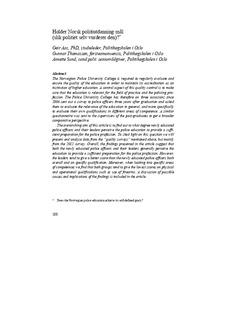Holder Norsk politiutdanning mål (slik politiet selv vurderer den)?
Journal article, Peer reviewed
Published version
Permanent lenke
http://hdl.handle.net/11250/2622102Utgivelsesdato
2019Metadata
Vis full innførselSamlinger
Sammendrag
The Norwegian Police University College is required to regularly evaluate and ensure the quality of the education in order to maintain its accreditation as an institution of higher education. A central aspect of this quality control is to make sure that the education is relevant for the field of practice and the policing profession. The Police University College has therefore on three occasions since 2006 sent out a survey to police officers three years after graduation and asked them to evaluate the relevance of the education in general, and more specifically to evaluate their own qualifications in different areas of competence. A similar questionnaire was sent to the supervisors of the post-graduates to get a broader comparative perspective.
The overarching aim of this article is to find out to what degree newly educated police officers and their leaders perceive the police education to provide a sufficient preparation for the police profession. To shed light on this question we will present and analyse data from the “quality surveys” mentioned above, but mainly from the 2015 survey. Overall, the findings presented in the article suggest that both the newly educated police officers and their leaders generally perceive the education to provide a sufficient preparation for the police profession. However, the leaders tend to give a better score than the newly educated police officers both overall and on specific qualification. Moreover, when looking into specific areas of competences we find that both groups tend to give the lowest scores on physical and operational qualifications such as use of firearms. A discussion of possible causes and implications of the findings is included in the article.
